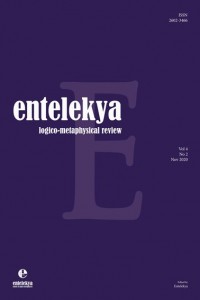Abstract
References
- Altuner, İlyas. “Ontological Bases of the Universe in Plato’s and Aristotle’s Cosmologies.” Iğdır University Journal of Social Sciences 3 (2013): 1-10.
- Birand, Kâmıran. İlk Çağ Felsefesi Tarihi. Ankara: Ankara Üniversitesi İlahiyat Fakültesi Yayınları, 1958.
- Cassirer, Ernst. İnsan Üstüne Bir Deneme. Tr. trans. Necla Arat. İstanbul: Remzi Kitabevi, 1980.
- Copleston, Frederick. “Bölüm 1a: Ön-Sokratikler ve Sokrates.” Felsefe Tarihi: Yunanistan ve Roma. Tr. trans. Aziz Yardımlı. İstanbul: İdea Yayınevi, 1997.
- Hadot, Pierre. İlkçağ Felsefesi Nedir? Tr. trans. Muna Cedden. Ankara: Dost Kitabevi, 2011. Herakleitos. Fragmanlar. Tr. trans. Cengiz Çakmak. İstanbul: Kabalcı Yayınevi, 2005.
- Jones, William T. Batı Düşüncesi Tarihi, vol. I. Tr. trans. Hakkı Hünler. İstanbul: Paradigma Yayınları, 2006.
- Özkan, Fatih. “Sokrates’in Entelektüalist Ahlakı.” Iğdır Üniversitesi Sosyal Bilimler Dergisi 4 (2013): 35-53.
- Platon. Devlet. Tr. trans. Sabahattin Eyuboğlu and M. Ali Cimcoz. İstanbul: Türkiye İş Bankası Kültür Yayınları, 2001.
- Platon. Kriton. Tr. trans. Furkan Akderin. İstanbul: Say Yayınları, 2010.
- Platon. Menon. Tr. trans. Furkan Akderin. İstanbul: Say Yayınları, 2012.
- Platon. Phaidon. Tr. trans. Suut Kemal Yetkin and Hamdi Ragıp Atademir. Ankara: Milli Eğitim Bakanlığı Yayınları, 1997.
- Platon. Phaidros. Tr. trans. Furkan Akderin. İstanbul: Say Yayınları, 2017.
- Platon. Sokrates’in Savunması. Tr. trans. Furkan Akderin. İstanbul: Say Yayınları, 2015.
- Platon. Timaios. Tr. trans. Furkan Akderin. İstanbul: Say Yayınları, 2015.
- Russ, Jacqueline, ed. Felsefe Tarihi: Kurucu Düşünceler, vol. I. Tr. trans. İsmail Yergöz. İstanbul: İletişim Yayınları, 2011.
- Stevenson, Leslie, et al. İnsan Doğası Üzerine On Üç Teori. Tr. trans. Damla Tanla. İstanbul: The Kitap Yayınları, 2018.
- Stevenson, Leslie. Yedi İnsan Doğası Kuramı. Tr. trans. Necla Arat, et al. İstanbul: Say Yayınları, 2005.
Abstract
Plato argued that knowledge of human nature can be reached through dialogue and dialectical method in accordance with the Socratic heritage. In his philosophy, man can be defined as being capable of rationally answering a rational question. By giving rational answers to himself and others, human also becomes a moral subject. In Plato's philosophy, we see a clear program based on human nature. Issues related to human nature are discussed in the process of applying Plato's theory of ideas to the field of morality, art, politics and education. What emerges in practice, for example, right and fair behavior is a manifestation of the principle of truth and justice. According to Plato, man reflects the character of the state he lives in. To understand a person, it is necessary to consider the society in which he lives. The state is not an institution that people come together and establish with their own will, but an organism, a whole. According to Plato, in order to grasp the true meaning of human society and to arrange it properly, one must first comprehend the astronomical cosmos. Because, knowing the meaning of the concepts of harmony and order is possible only by understanding the astronomical cosmos, which is the expression of an eternal order. While studying the astronomical cosmos, a man comes to the idea of harmony and order itself. Indeed, the infinite canonical and harmonious movements of the stars in this pre-eternal order on their perennials lead to the concept of law itself. People who admire this harmony and order in the sky want to realize a model of it on earth. He concludes that the laws that will rule over the human world must be continuous and compatible, just like the laws in the world of stars. Thus, the state must be an earthly model of the astronomical cosmos. If a person lives in the state, he should realize this harmony and order in the state in his own spirit.
Keywords
References
- Altuner, İlyas. “Ontological Bases of the Universe in Plato’s and Aristotle’s Cosmologies.” Iğdır University Journal of Social Sciences 3 (2013): 1-10.
- Birand, Kâmıran. İlk Çağ Felsefesi Tarihi. Ankara: Ankara Üniversitesi İlahiyat Fakültesi Yayınları, 1958.
- Cassirer, Ernst. İnsan Üstüne Bir Deneme. Tr. trans. Necla Arat. İstanbul: Remzi Kitabevi, 1980.
- Copleston, Frederick. “Bölüm 1a: Ön-Sokratikler ve Sokrates.” Felsefe Tarihi: Yunanistan ve Roma. Tr. trans. Aziz Yardımlı. İstanbul: İdea Yayınevi, 1997.
- Hadot, Pierre. İlkçağ Felsefesi Nedir? Tr. trans. Muna Cedden. Ankara: Dost Kitabevi, 2011. Herakleitos. Fragmanlar. Tr. trans. Cengiz Çakmak. İstanbul: Kabalcı Yayınevi, 2005.
- Jones, William T. Batı Düşüncesi Tarihi, vol. I. Tr. trans. Hakkı Hünler. İstanbul: Paradigma Yayınları, 2006.
- Özkan, Fatih. “Sokrates’in Entelektüalist Ahlakı.” Iğdır Üniversitesi Sosyal Bilimler Dergisi 4 (2013): 35-53.
- Platon. Devlet. Tr. trans. Sabahattin Eyuboğlu and M. Ali Cimcoz. İstanbul: Türkiye İş Bankası Kültür Yayınları, 2001.
- Platon. Kriton. Tr. trans. Furkan Akderin. İstanbul: Say Yayınları, 2010.
- Platon. Menon. Tr. trans. Furkan Akderin. İstanbul: Say Yayınları, 2012.
- Platon. Phaidon. Tr. trans. Suut Kemal Yetkin and Hamdi Ragıp Atademir. Ankara: Milli Eğitim Bakanlığı Yayınları, 1997.
- Platon. Phaidros. Tr. trans. Furkan Akderin. İstanbul: Say Yayınları, 2017.
- Platon. Sokrates’in Savunması. Tr. trans. Furkan Akderin. İstanbul: Say Yayınları, 2015.
- Platon. Timaios. Tr. trans. Furkan Akderin. İstanbul: Say Yayınları, 2015.
- Russ, Jacqueline, ed. Felsefe Tarihi: Kurucu Düşünceler, vol. I. Tr. trans. İsmail Yergöz. İstanbul: İletişim Yayınları, 2011.
- Stevenson, Leslie, et al. İnsan Doğası Üzerine On Üç Teori. Tr. trans. Damla Tanla. İstanbul: The Kitap Yayınları, 2018.
- Stevenson, Leslie. Yedi İnsan Doğası Kuramı. Tr. trans. Necla Arat, et al. İstanbul: Say Yayınları, 2005.
Details
| Primary Language | English |
|---|---|
| Subjects | Philosophy |
| Journal Section | Article |
| Authors | |
| Publication Date | November 30, 2020 |
| Published in Issue | Year 2020 Volume: 4 Issue: 2 |


